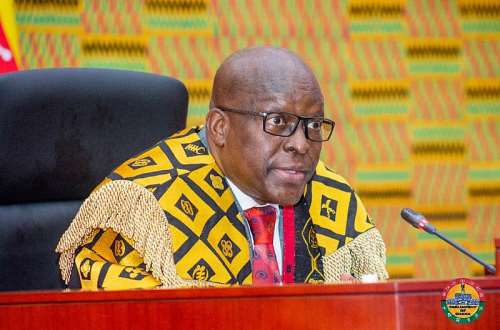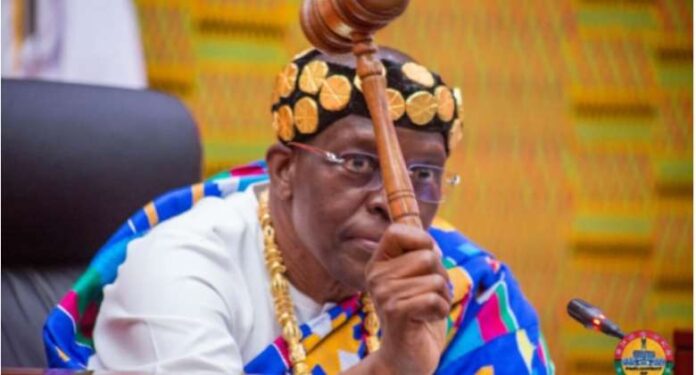RULING OF THE RT. HON. ALBAN S. K. BAGBIN, SPEAKER OF THE EIGHTH PARLIAMENT OF THE FOURTH REPUBLIC OF GHANA IN RESPECT OF A PRELIMINARY OBJECTION RAISED BY THE MAJORITY LEADER TO THE REPORT OF THE PRIVILEGES COMMITTEE BEING PRESENTED FOR THE DECISION OF THE PARLIAMENT LISTED ON 28TH JULY 2022
- Hon Members, as you may recall, during the last sitting of the second meeting of the second session, that is, on the 28th day of July 2022, the Hon. Osei Kyei-Mensah-Bonsu, Majority Leader and Minister for Parliamentary Affairs, raised a preliminary objection as to the listing of one motion on the Order Paper of 28th July 2022. The said motion was for the adoption of the report of the Committee on Privileges on the alleged breach of article 97(1)(c) of the Constitution of the Republic. The Majority Leader took the view that the motion should not have been listed on the Order Paper and thus same should be withdrawn. His submission was that the determination of the Committee was conclusive and same should not be subjected to the House in plenary for a debate and determination. To quote him;
“The Privileges Committee has presented its report and, in my considered opinion, based on the Constitution and not sentiments, is that, there should be that automaticity, once the Committee makes a determination. I disagree that the decision should be taken by the House”.
- The Minority Leader, Hon Haruna Iddrisu dissented and submitted that like any other Committee of the House, the Privileges Committee’s report should be subjected to the plenary for a debate in consonance with Order 164 of the Standing Orders of Parliament, which mandates the Committee to “recommend” its findings to the House, which shall be put to a vote. The Minority Leader noted that it was appropriate for the report to be captured on the Order Paper for consideration by the House. He stated further that there were precedents on this matter and referred the House to the case of former MP, Mr. Eric Amoateng.
- After hearing both the Hon. Majority and Minority Leader and some other Members of Parliament, I indicated that due to the gravity of the issues raised on the matter, I required some time to provide a reasoned ruling. I accordingly deferred my ruling on the matter to this meeting.
- It is against this backdrop that I am giving this ruling to give clarity to the matters in contention and to ensure that progress is made on this matter. The issues raised by the Hon Majority Leader with respect to the listing of the motion are critical issues of public interest and I deem it my sacred constitutional duty as the Speaker of the House to provide clarity and bring certainty to bear on this matter in accordance with the Constitution and the Standing Orders of Parliament.
- The decision on whether or not a seat is vacant is one that must be carefully considered and one for which our Constitution, our courts and the rules and best practices of other Parliaments have provided significant guidance. Our job as a House would not be to usurp the functions of any of the arms of Government but simply to apply the law faithfully and in accordance with the dictates of the Constitution of Ghana, 1992.
BACKGROUND TO THE PRELIMINARY OBJECTION
- In view of the antecedents of the objection raised by the Hon Majority Leader, it is necessary to recount the facts of the matter before us, from its inception up to and including the stage it has reached before the House.
- On the 5th of April 2022, on the conclusion of an attendance audit by the Table Office based on a number of petitions, I referred three Members of Parliament to the Committee of Privileges for their failure to attend Parliament without the permission in writing of the Speaker for fifteen (15) sitting days. The Members were the Hon. Kennedy Ohene Agyapong, MP for Assin Central, Hon. Henry Quartey, MP for Ayawaso Central and the Hon. Sarah Adwoa Safo, MP for Dome Kwabenya.
- Pursuant to Article 97(1)(c) of the Constitution, the mandate of the Committee involves a determination of facts as to whether the three Hon Members absented themselves from attendance of Parliament for fifteen sitting days and if so, whether the absence from the 15 sittings was based on a permission in writing of the Speaker. In case the absence was not based on such permission, whether the three Hon Members have reasonable explanations for so absenting themselves from those sittings Parliament.
- Out of the abundance of caution, it is important to reproduce the constitutional and subsidiary rules that govern how this House must act when a member has absented him/herself from Parliament for fifteen (15) sitting days.
Clause (1) c of article 97 provides:

“97. (1) C. A member of Parliament shall vacate his seat in Parliament if he is absent, without the permission in writing of the Speaker and he is unable to offer a reasonable explanation to the Parliamentary Committee on Privileges from fifteen sittings of a meeting of Parliament during any period that Parliament has been summoned to meet and continues to meet;”.
This is, in my humble opinion a very straightforward provision. It states that if three events occur an MP must vacate his/her seat. These are; (1) unpermitted absence; (2) from 15 sittings in a meeting; (3) inability to provide a reasonable explanation to the Parliamentary Committee on Privileges. It is evident from the wording of the Article that this is a conjunctive article. This means all three events must be established for an MP to vacate his/her seat.
The Constitutional provision is supplemented, however, by Order 16 (1) of the Standing Orders of Parliament which provides:
“16. (1) A Member shall not absent himself during a meeting for more than fifteen sittings without the permission in writing of the Speaker. Any Member infringing this order shall have his conduct referred to the Privileges Committee”
Furthermore, Order 18 of the Standing Orders provides:
“18. The seat of a Member shall be declared vacant by Mr. Speaker under clause (1)(b) to (h) of article 97 of the Constitution”
- Hon Members, there is a school of thought that holds the view that once a Member of Parliament has been found to have been absent from Parliament for fifteen sitting days without the permission of the Speaker, the seat of that Member is vacant. This view found expression in the submissions of a number of MPs of this Parliament on this matter. I disagree with this school of thought because it is based on a partial reading of the text of the Constitution as contained in article 97(1)(c). Read as a whole, article 97(1)(c) contemplates, that a seat of a member, which has been determined, for example, through an audit of the attendance book by the Table Office or a Member or any other person, to have been unoccupied by the absence from Parliament of an incumbent MP, for fifteen sitting days without the permission in writing of the Speaker, may still be saved if that Member provides a reasonable explanation to the Committee on Privileges. The findings of fact and evidence, as well as the recommendations of the Committee are then presented to the House of Parliament for its consideration. The Order, mode and authority for the presentation of business and of the report of a Committee to the House is by a motion or a paper to be moved or presented usually by the Chairman of the Committee, member or as otherwise agreed to by the House. See Standing Orders, 53, 54, 160 and 161.
- Item 55 on the Order Paper of Thursday 28th July 2022 read as follows:
“That this Hon House adopts the Report of the Committee of Privileges on the alleged breach of Article 97(1)(c) of the 1992 Constitution and Order 16(1) of the Standing Orders of Parliament by three Hon. Members of Parliament during the First Meeting of the Second Session of the Eight Parliament of the Fourth Republic of Ghana”
(Chairman of the Committee)

- As captured in the introductory paragraphs of this ruling, the Hon Majority Leader raised an objection to the listing of the said item. He alluded, in addition, to what has been capture above, that the motion ought not to have been listed on the Order Paper as the information that came from the Committee of Privileges should have been submitted as a Paper. He argued further that the matter in issue should not be the subject matter of a Motion as it does not require the approval of Parliament.
- The Hon Majority Leader added that, once the Committee of Privileges made a determination as to the reasonableness or otherwise of the excuse provided by the Hon Members of Parliament for their absence, an automatic determination was made as to the vacancy of the seat in question and thus the House as a whole had no role to play.
- The Majority leader relied on some provisions in the Constitution where the work of a Committee of Parliament was not subject to consideration of the House. According to him, in those instances, upon the conclusion of the work of the Committee, this House becomes functus officio. The Hon Majority Leader cited, among others, the role that the Committee on Finance plays when that Committee authorizes the withdrawal of funds from the Contingency Fund “whenever that committee is satisfied that there has arisen an urgent or unforeseen need for expenditure for which no other provision exists to meet the need.” (See article 177(1) of the Constitution).
- For purposes of emphasis, the Hon. Minority Leader argued in favor of the listing of the motion. In the view of the Minority Leader, based on the precedents of the House, rather than argue against the listing of the motion, the appropriate step to take was for the Majority Leader to request the Speaker, to call on the Chairman of the Committee to move the motion on the floor since the matter had been referred to the Committee and the Committee had submitted its report to the House.
- The Hon Minority Leader also relied on a statement in the judgment of the Court of Appeal in the case of Professor Stephen Kwaku Asare v the Attorney General & 3 Ors (Unreported, 2008) (Suit No H1/65/07) (Court of Appeal), that;
“The Speaker referred the letter to the Parliamentary Committee on Privileges, which met on 22nd February 2006 and recommended to the House of Parliament on 2nd March 2006”.
- The Hon Minority Leader took the position that any recommendation from the Committee on Privileges must be subjected to the same threshold and held to the same standard as was done in the case of the former Member of Parliament for Nkoranza North, Eric Amoateng.
- The reply of the Majority Leader to the above submission of the Minority Leader is that, the procedure adopted by the House in the Eric Amoateng’s case is a bad precedent and same should not be followed by the House.
- From the foregoing summary of the preliminary objection of the Hon Majority Leader and the response to that objection by the Hon Minority Leader, I can see clearly that two pertinent issues have been raised for my determination. These are (1) whether the motion advertised as Item 55 on the Order Paper ought not to have been admitted and listed as a motion but as a paper for the information of the House and (2) whether this House has power to consider and adopt the report of the Committee on Privileges?
Whether or not the Motion ought not to have been admitted and listed on the Order Paper but should have come as a paper?
- Hon Members, you may recall that I delivered a ruling dated 20th January 2021 which dealt with the competence and admissibility of motions. In that ruling I noted that the admissibility or otherwise of a motion for listing on the Order Paper was the exclusive preserve of the Speaker. My power to admit motions is provided for under Orders 78 and 79(4) of the Standing Orders as follows:
“78. Unless any Order otherwise provides, notice shall be given of any motion which is proposed to make, except…
- (4) Every notice shall be submitted to Mr. Speaker who shall direct that it be printed in its original terms or with such amendments as he shall direct, or that it be returned to the Member submitting it as being inadmissible.”
It is clear from the above provisions that the power to admit a motion is vested exclusively in the Speaker. It is trite knowledge that the exercise of that power by the Speaker is not subject to challenge except by a substantive motion. (See Order 98 of the Standing Orders of Parliament and the practice of the House). A mere objection without notice on the floor of this House is not a sufficient basis to overturn the decision to admit a motion such as the motion advertised as Item numbered 55 on the Order Paper of 28th July 2022.
- Be that as it may, the Hon Majority Leader’s objection seeks to question the propriety of the decision to admit the motion numbered 55 on the said Order Paper. As defined in Order 7 of the Standing Orders, a motion “means a proposal made by a member that Parliament or a Committee thereof to something, order something to be done, or express an opinion concerning some matter”. In simple terms, and in accordance with accepted practice and conventions of this House, a motion is a mechanism for decision-making by the House because it sets in motion the process for arriving at a decision. Such a motion may be admitted by the Speaker to be moved if, before the commencement of the sitting, the Member submits to the Speaker, a written notification of the matter to be raised.
- When the Speaker determines that, a motion on a specific matter be moved, such a motion would be considered admitted and the Member shall be allowed to move the motion accordingly.
- The Hon Majority Leader further submitted forcefully that the motion listed as number 55 on the Order Paper is incompetent and ought to have been laid in the form of a paper for the information of the House. Implicit in this argument is the notion that when the report of a committee is laid as a paper then its’ content is determinative, and this House cannot purport to take any further action on it by way of a debate and vote. This dichotomy that the Hon Majority Leader sought to draw between a paper and a motion is, with all due respect, a false dichotomy. It is a comparison that does not yield accurate analytical outcomes. I will proceed to demonstrate why this is so.
- The Standing Orders of this House provide for the presentation of papers. In terms of Order 74, papers may be presented only by the Speaker, the Chairman of a Committee, a member or a Minister. The mode of presentation of papers is governed by Order 75 which provides, among others, that (1) as soon as sufficient copies of a paper for distribution to Members have been received in the office of the Clerk, notice of the presentation of that Paper may be placed on the Order Paper, and as soon as Mr. Speaker announces “Papers for presentation” the paper shall be deemed to have been laid on the Table. (2) if so desired by the person presenting a Paper, a short explanatory statement may be made by him upon its presentation.
- The tenor of the provisions on the presentation of papers suggests to me that the latitude of action regarding deliberation, debate and decision is extremely restricted when papers are laid. However, it does not mean, as the Hon Majority Leader sought to imply, that this House cannot take steps to adopt or approve such a “paper” by motion. As a matter of practice and convention of some Parliaments, papers are laid for the information of the House and may not be the subject matter of deliberation, debate and decision. But a paper that is in the form of a report of a committee of this House may be laid and debated using the method of a motion, save expressly and specifically excepted by law.
- This position is buttressed by the requirements of the Standing Orders of this House, particularly Order 161, which stipulates, that recommendations of a committee be presented to the House in the form of a report and that “at any time after the report has been presented to the House, a motion may be moved by the Chairman of the Committee for the acceptance of the Report.” (See para.2, Order 161). This provision would definitely be rendered inutile if we were to accept the position adumbrated by the Hon Majority Leader.
- Moreover, precedent from other jurisdictions support the view that I have taken of this matter. For instance, a publication of the Parliament of Australia tituled, House of Representatives Practice (Seventh Edition) relating to the committee of that House known as the Committee of Privileges and Members’ Interests details the practice following the laying of a report of the Committee as follows:
“On presentation of the committee’s report to the House by the chair, the practice is for the report to be ordered to be made a Parliamentary Paper. The House may then order that it be taken into consideration at the next sitting or on a specified day…. A motion or motions may be moved declaratory of the House’s view on the committee’s report and recommendations and in respect of the House’s proposed action.”
Also refer to the practice in New Zealand, India Lok Sabha, United Kingdom House of Commons, Canada, and the United States of America.
- Having disposed of the question whether the report of the Committee on Privileges ought to have come by way of a motion or whether it ought to have been laid as a Paper, I will now turn my attention to the substantive issue of whether the House sitting in plenary can consider the report of the Committee for purposes of its adoption.
Can the House in Plenary consider the report of the Committee?
- Hon Members may recall that in my formal statement on matters relating to the vacancy of the seat of a Member of Parliament for reason of absence from Parliament, I provided a context on how the House ought to proceed on the matter of absenteeism and what steps should be taken in that respect.
- After a careful review of the constitutional provisions, our Standing Orders, case law and the rules and practice of other Parliaments around the world, on a matter of absenteeism of an MP from sittings of Parliament, I noted that a member or any person would be estopped from raising an issue of absenteeism after the meeting and thus a Member of Parliament, or any person desirous of doing same must act timeously during the course of the meeting the MP is alleged to be absent from the sittings of the House.
- I also noted that the combined effect of our Constitution, Standing Orders and case law provides a certain process to be followed when it comes to the notice of the House that a member had absented him/herself from the sittings of Parliament in a manner that is inconsistent with the letter and spirit of Article 97(1)(c) of the 1992 Constitution.
- For the avoidance of doubt, I reiterate what I highlighted in that statement. Paragraph 19 of the Statement read and I quote:
“19. In the light of the combined reading of the provisions in the Constitution and the Standing Orders above, coupled with a decision of the Court of Appeal, on the question of when a seat of a Member of Parliament is vacant by reason of absenteeism, the following processes should be complied with;
- The Member must have been absent from a Meeting for fifteen sittings in that Meeting without the permission of the Speaker in writing based on the evidence from the Votes and Proceedings of Parliament.
- The fact of the absence of the Member without permission of the Speaker may be raised on the floor of Parliament by a Member and the matter referred to the Committee of Privileges for consideration and report to the House.
- The Member so referred shall be required to offer an explanation for the absence to the Committee of Privileges which shall consider whether the explanation is reasonable.
- The Committee of Privileges after consideration, shall recommend to the House such action as the Committee may consider appropriate.
- The House shall vote on the recommendation of the Committee. Where in the event that the Committee’s recommendation to the House is to the effect that the Members’ explanation is reasonable and the House adopts that recommendation, the Members’ seat shall not be declared vacant”.
- Where in the event that the Committee’s recommendation to the House is to the effect that the Members’ explanation is unreasonable and the House adopts that recommendation, the Members’ seat shall be declared vacant by Mr. Speaker.
- Where Mr. Speaker has declared a seat vacant by reason of absenteeism, the Clerk to Parliament shall within seven days of the declaration notify the Electoral Commission for the necessary processes for a by-election to commence.”
- Having regard to the process outlined above, the Committee of Privileges considered the matter of absenteeism involving the three Members who had absented themselves from fifteen sittings of the House in a meeting without the permission in writing of the Speaker. I will give a fully explanation of the role each of the actors plays in this matter, if necessary, at the conclusion of this matter. Suffice for this purpose, to restrict myself to the role of the Committee of Privileges. The Committee has a singular mandate in respect of these matters, and that is, to establish that the member absented him/herself from the sitting of Parliament for 15 days in a meeting without the permission of the Speaker in writing, enquire into the reasonableness or otherwise of the explanation offered by the affected Member/s and to report to the House.
- Order 7 defines a Standing Committee, like the Committee of Privileges, as a committee appointed under article 103(1) of the Constitution to enquire into and report on such matters as may be referred to it from time to time or on a continuous basis for the duration of Parliament.
- The Committee of Privileges is a Committee of Parliament constituted pursuant to Article 103 of the Constitution. As a Committee of Parliament, the way in which the Committee conducts its business is regulated by the Standing Orders of the House.
- It is provided by Article 110(1) of the Constitution, 1992 that
“Subject to the provisions of this Constitution, Parliament may, by standing orders, regulate its own proceedings”.
- Article 97(1)(c) stipulates the conditions under which the seat of a Member of Parliament may be vacant. Put differently, once the Member has (a) been absent from Parliament for fifteen sittings of a meeting of Parliament; (b) not obtained the permission of Mr. Speaker in writing to be absent and (c) cannot offer a reasonable explanation to the Parliamentary Committee on Privileges, the member automatically vacates the seat. This is the position that was endorsed in the case of Professor Stephen Kwaku Asare v the Attorney General & 3 Ors (Unreported, 2008) (Suit No H1/65/07) (Court of Appeal),
“The Plaintiff/Appellant (hereinafter referred to as the Appellant) contends that once a member absents himself from parliament without explanation for more than 15 sittings in this case, that member’s seat automatically becomes vacant by operation of law. This argument is sound in law and I accept it.”
- On the other hand, Order 161 of the Standing Orders provides:
“(1) The recommendations of a Report of Committee shall be presented to the House in the form of a report.
(2) At any time after the report has been presented to the House a motion may be moved by the Chairman of the Committee for the acceptance of the Report.”
- Our Orders specifically require that the recommendations of a committee must be subject to the consideration of the House and that the plenary plays an important role in choosing to adopt or reject the recommendations. The rationale for this structure is that committees of Parliament are microcosms and extensions of the House as a whole; they are handmaidens whose core constitutional function is to assist Parliament, in the language of article 103(1) of the Constitution, in “the effective discharge of its function”.
- There are however a few exceptions to this general rule. As noted by the Majority Leader, Articles 106(13) and 177 provide instances where the Committee of Parliament’s work operates to automatically bind the House and no consideration whatsoever is required by the Plenary in these instances. May I add that it is also the case with the recommendations of the Committee of Members Holding Office of Profit. In such instances the Constitution specifically says so.
- Most Parliamentary decisions are made by the House, acting on the recommendations of one of its committees. It does not follow that all decisions in Parliament must be done that way. Where the Constitution itself specifies a particular process for deciding then it is that process that must be followed. This is because general things do not derogate from special things. However, in contrast with these instances cited, there is nothing expressly stated or necessarily implied in Article 97(1)(c) to the effect that the conclusion of the work of the Committee of Privileges also concludes the matter and no action may be taken by the House on the findings and recommendations of the Committee. Furthermore, the instances cited are not referrals from the House to a Committee of the House.
- Article 177 for instance, indicates that the advances from the Contingency Fund may be authorized by the Committee for Finance once the committee is satisfied that there has arisen an urgent or unforeseen need for expenditure for which no other provision exists to meet the need. The plenary in this case is not seized with jurisdiction to make a reference or determination on the decision of the Committee for Finance.
- The distinction between this provision and Article 97(1)(c) is that, in the case of the former, no referral is made by the House in any way to the Committee for Finance. The Minister responsible for Finance, in making a request for an advance from the Contingency fund is not required to come to the House but can submit his request to the Committee for Finance. The House plays no role in the process. The Constitution mandates the Minister of Finance, after the authorization of the Committee of Finance, to as soon as possible present a supplementary estimate for the purpose of replacing the amount so advanced.
- On the contrary, in relation to the matter before us, the absenteeism of the three (3) Members is referred to the Committee in accordance with Article 97(1)(c) after the allegation that the members were absent for 15 days without the permission in writing by the Speaker. A committee of the House is then called upon to enquire into the allegations and report to the House for a decision.
- I find the position canvassed strongly by the Majority leader as untenable for the simple reason that, where the framers of the Constitution intended that a committee be clothed with exclusive jurisdiction on a matter without reference to the House, it has expressly (as in the case of articles 106(13) and 177) indicated so within the text of the Constitution. To the extent that a similar express mandate is not conferred on the Privileges Committee in respect of matters arising under Article 97(1)(c), Parliament’s procedure with respect to the work of Committees must of necessity apply.
- To imply any mandate into Article 97(1)(c) is one I am not prepared to do. Pursuant to article 110 of the Constitution, my understanding is that where the Constitution does not provide a procedure, Parliament may regulate the procedure within that space as long as it does not offend the Constitution. It is in accordance with this power that Parliament captured the dictates of Art 97(1)(c) in Order 16(1) which is to the effect that once a member is alleged to be in breach of the provision, his conduct is referred to the Committee of Privileges for enquiry.
- For the purpose of reiterating my humble view, once a referral has been made therefore, the report of the Committee does not complete the inquiry into the matter. The report of the Committee of Privileges, just like that of any other committee is subject to the consideration of the House by way of a motion. Again, I am inspired and convinced this position of the law by the provisions of the Constitutions, rules of procedure and practice of United Kingdom, India, Canada, New Zealand and Australia.
CONCLUSION
- Honorable Members, as I have noted in this ruling, the decision as to whether or not to admit a motion is the exclusive preserve of the Speaker.
- In view of the foregoing, the House, is well within its rights to receive and consider the report of the Committee and make a determination arising out of the recommendations.
- In the circumstances, it is my ruling that, the motion was rightfully admitted and the report of the Committee is subject to the consideration of the House. It goes without saying that the preliminary objection of the Majority Leader to the admissibility of the motion for consideration of the report of the Committee, is hereby dismissed in limine.















